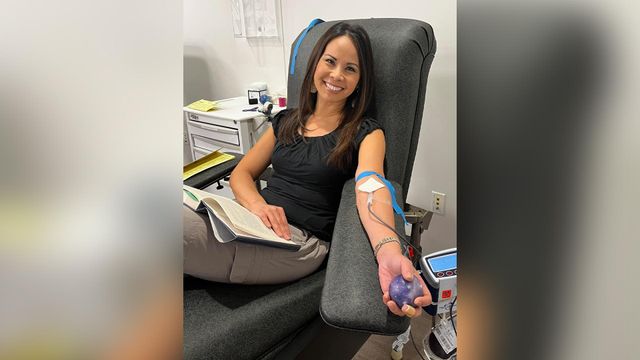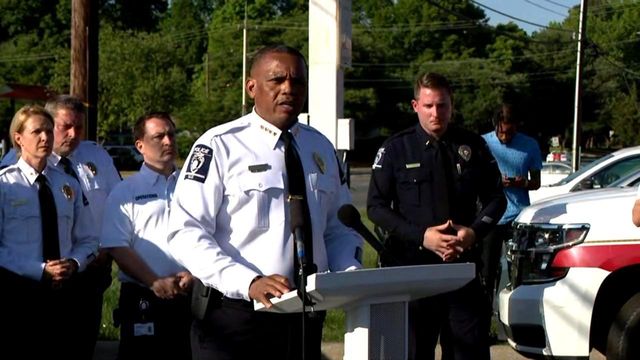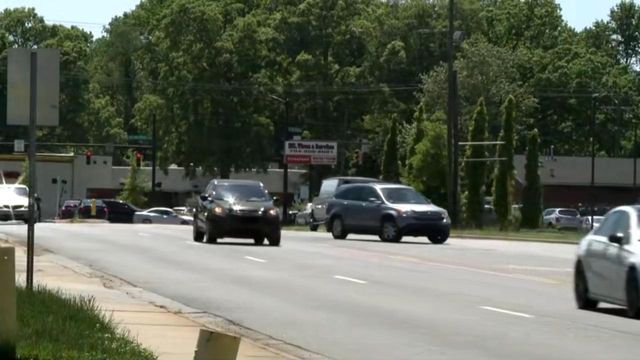Only 3% of US adults donate blood despite national shortage. Here's how Raleigh is doing
Giving blood is quick, easy and mostly painless, but most Americans don't do it.
The American Red Cross reports the United States is facing an emergency blood shortage, with the lowest number of people giving blood in 20 years. What does that mean for our local hospitals, and why aren't more people donating?
Only 3% of US adults donate blood
There are many reasons people avoid giving blood. For some, it may be nerves. Many others may feel like it's inconvenient or that they are too busy to make time in their schedules.
Data from The Blood Connection shows approximately 3% of the U.S. population donates blood each year -- although 62% of the population is eligible to donate. Of those who donate blood, individuals on average donate only 1.8 times per year.
According to those numbers, WRAL anchor Renee Chou is a rarity. In 2023, Chou donated blood five times. This year, she's aiming for six, the maximum number of times a person can donate each year.
Chou said she first gave blood in high school.
"I just remember doing it and thinking, 'That was pretty easy. That wasn't bad at all,'" she said.
Chou donated blood frequently through high school and college. She began donating regularly again during the COVID-19 pandemic, when the blood shortage was reported.
"I thought to myself, I should get back to doing that again. I should make time for it," Chou said.
Mackenzie O'Donnell, 21, also gives blood several times each year, saying she and her partner treat giving blood a date -- after they donate, they go to the movies. They both signed up for texts from The Blood Connection to get notified when there is a demand.
Since The Blood Connection offers electronic gift cards for free movie tickets, after giving blood, the couple goes to the movie theater.
"If we both have a day off, we check to see if enough time has passed so we can donate again," O'Donnell said.
What is giving blood like?
Wondering what it's like to give blood? The entire process usually takes between 45 minutes to 1 hour of a donor's time, although the blood donation itself lasts less than 10 minutes. The American Red Cross outlines the entire process online.
Donors should be ready to provide identification and answer questions in a private interview about their health history, medications, places traveled and how they are feeling.
Donors will also have their temperature, pulse, blood pressure and hemoglobin level checked before getting the approval to donate. All donated blood is tested before it is used for patients.
Does giving blood hurt?
Donating blood is very similar to getting your blood drawn at a routine physical.
Blood donors will be reclined and in a relaxed position when it's time to donate. A phlebotomist may tie a band around your arm and ask you to make a fist -- or squeeze a stress ball -- while they locate a vein. This feels like pressure, but it's not painful. The needle stick itself is quick and feels like a pinch.
"Just knowing that a little convenience, a little prick, can help someone ... for me it makes it worthwhile," Chou said.
Tips for giving blood
It is important to eat full meals, with snacks, before donating. It's also a great idea to bring a podcast or book along with you.
Make sure to drink plenty of water in the hours before you give blood.
"I definitely recommend drinking lots of fluids .. your veins are easier to find when you’re well hydrated," O'Donnell said.
You can workout as normal before donating blood, but it's important to rest for the rest of the day.
If you're feeling nervous, that's normal. Even though she donates regularly, O'Donnell said she still gets anxious.
"You just need to get in your zen," O'Donnell said.
Who can donate blood?
Almost anyone 17 and older is eligible to donate blood. Donors must weigh at least 110 pounds and be in good health.
Whole blood donors must wait 56 days (eight weeks) before they can donate blood again. That means an eligible individual can donate up to six times each year.
Why do Triangle hospitals need blood?
A variety of patients need blood every day, including trauma patients, cancer patients, premature infants and surgical patients. According to the American Red Cross, each blood donation can save up to three lives.
The Blood Connection, is a Raleigh-based organization that collects donor blood and distributes it to hospitals in four states, including over 30 hospitals across eastern North Carolina.
The Blood Connection aims to collect around 300 units of blood daily in the Raleigh area through the main blood donation center and mobile units deployed across the state.
"That is to provide what they need, but that doesn't account for the emergency situations that might arise,” said Ellen Kirtner, a spokesperson for The Blood Connection. “If [there’s] a trauma or a car accident we want to make sure that we've got that blood for the hospitals.”
"A car accident or another type of emergency can deplete our blood inventory pretty quickly and we depend on donors to help replenish that supply," said Dr. Blake Hutchinson, a pathologist who oversees the blood bank at UNC Health Rex in Raleigh. "Blood products cannot be manufactured in the lab, so we depend on blood donors for all transfusion needs."
Kitner said The Blood Connection is not currently facing a blood shortage or crisis, but blood is a resource that is needed consistently. Donated blood doesn't last forever -- it must be transfused within 42 days of collection, according to The Blood Connection.
“We continue to encourage donors to come out and donate in case something arises,” Kirtner said. “The blood supply is reliant on the community … because it can't be replicated or created in a lab -- it has to come from a volunteer donor.”
A spokesperson said UNC Health’s hospitals across the Triangle (Raleigh, Holly Springs, Smithfield, Clayton, Chapel Hill and Hillsborough) use about 170 units per day (including red blood cells, plasma products and/or platelets). UNC Health Rex in Raleigh and UNC Hospitals in Chapel Hill perform the most blood transfusions.
Do NC hospitals have enough blood?
A spokesperson for UNC Health said, thanks to regularly-scheduled blood suppliers, blood inventory at UNC hospitals has been at or close to maximum inventory goals, and all patients have been able to get the blood they needed.
Why is a US blood shortage being reported?
According to Kirtner, blood donor turnout began dropping in 2022, when the COVID-19 pandemic was still in full swing. The good news is blood donor numbers are increasing again, she said.
Data from The Blood Connection shows there were approximately 6.5 million donors in 2021, an 11% drop from 2019, which had approximately 7.3 million donors.
According to Kirtner, donor turnout was surprisingly high at the beginning of the pandemic before it dropped.
“I think COVID brought awareness to the ease of donating blood,” Kirtner said. “We maintained our operations throughout the COVID-19 pandemic and donors continued to show up and donate blood because they knew there was a need ... when many people felt like they couldn't do something, donating blood was one thing that people could consistently do.”
Blood donated through The Blood Connection stays local, helping patients nearby.
“People realize it could be someone's neighbor that they're helping out. It could be a family member,” Kirtner said.
Rewards for giving blood
Organizers of blood drives have started handing out $25 or $50 gift cards, some even as high as $70, to donors. If a person donates blood six times a year, they could make $300, essentially getting paid while saving lives.
In 2021, during the shortage, the American Red Cross entered donors in a contest to win a trip to Hawaii.
Donors who donate blood through The Blood Connection receive “points” they can redeem for electronic gift cards and other gifts. A donor can also choose to donate their points back to a charitable organization.
“We’ve found that while some are motivated by the rewards, others are donating for the fact that they can help save a life, so it's really a mix of the two,” Kirtner said.
Who most needs blood donations?
Blood is most often needed for cancer patients and in emergencies. According to The Blood Connection, more than 80% of deaths in the operating room and nearly 50% of deaths in the first 24 hours after injury are due to severe blood loss.
Additionally, hospitals most often need blood for cancer patients, newborn babies and their mothers, patients with blood disorders, and others.
Data collected by The Blood Connection shows:
- More than a quarter of the U.S. blood supply is used by patients battling cancer.
- Transfusions are needed in the U.S. in one out of every 83 deliveries, and the rate of transfusions needed in childbirth in the U.S. increased by 54% between 2006 and 2015.
How to help: Donate blood or organize a blood drive
You can donate blood through the American Red Cross or The Blood Connection,.
Blood donors are always needed and appreciated, so consider making an appointment near you. The Blood Connection is always looking for people or organizations -- like schools, businesses or churches -- willing to host a blood drive.












